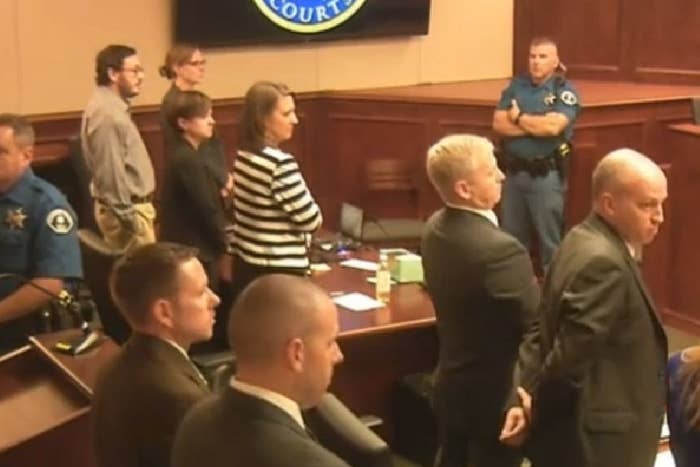
CENTENNIAL, Colo. — Colorado theater shooter James Holmes avoided the death penalty on Friday due to a single holdout on the jury, one juror said.
Holmes was sentenced to life in prison without the possibility of parole for killing 12 people and injuring 70 others inside an Aurora, Colorado, movie theater three years ago after the jury of nine women and three men could not reach the unanimous decision needed for the death penalty.
A woman who would only identify herself as Juror 17 told reporters outside the courthouse Friday that life in prison became the default sentence when one juror said they were firmly against the death penalty for Holmes. A couple of jurors were on the fence, she added, but were otherwise leaning toward a death sentence.
"We all felt mental illness was there, but probably disagreed on the impact of it," Juror 17 said.

During their final deliberations, a juror who sided with the death penalty for Holmes asked to review some of the most graphic images presented in the case — a 45-minute crime scene video showing blood and bodies — in an effort to sway the final hold out, Juror 17 said.
But, she added, "we ended the deliberations because that person was solidly in favor of a life sentence."
The jury deliberated for roughly seven hours beginning Thursday afternoon before notifying the judge that the panel had reached a decision that shocked and disappointed many who had hoped for the death penalty.
"I've tried to resolve Veronica's death and I can't," said Robert Sullivan, grandfather of slain 6-year-old Veronica Moser-Sullivan. "This just makes it worse."
From the outset, however, the prosecution faced a more difficult task.
"All the defense needed to do was convince one person that death was not the appropriate sentence," said Karen Steinhauser, an attorney and adjunct professor at the University of Denver. "The prosecution had to convince 12 people beyond a reasonable doubt that this was the appropriate sentence."

Holmes' defense attorneys never disputed what happened inside Theater 9 on July 20, 2012. Instead, they tried to show his descent from a promising young student into psychosis with the onset of schizophrenia, and argued that he should get life in prison.
At the post-verdict news conference, District Attorney George Brauchler said he too was disappointed that Holmes did not get the death penalty and instead "got what he wanted."
"I don't think there's any doubt he got what he wanted," Brauchler says of Holmes. #theatershooting
"I thought death, I still think death, is justice for what that guy did," Brauchler added. "But the system said otherwise, and I'll honor that and I'll respect that outcome."
He also praised jurors, saying they "did a hell of a job."
Prosecutors in Colorado have only sought the death penalty in the most extreme cases, and the Holmes case definitely qualified, Steinhauser said. Friday's outcome could be a sign of waning support from the public.
"If you can't get juries to find the death penalty in a case like this, what kind of case in Colorado are you ever going to get the death penalty anymore?"
Juror 17 called the decision a "devastating result no matter what."
"I think all the jurors feel so much empathy for the families," she said. "It is a tragedy"
Speaking to the media, she added, was therapeutic after not being allowed to discuss the case with anyone throughout the months-long trial.
"I felt we owed the community some information," she said. "I pray that there's no backlash because we truly did our best."
The jurors — as well as the many families touched by the case — must now live with the knowledge that Holmes will spend his remaining years behind bars.
"They have to now go forward, and it's not going to be easy," Steinhauser said. "It's not going to be easy for anyone."

